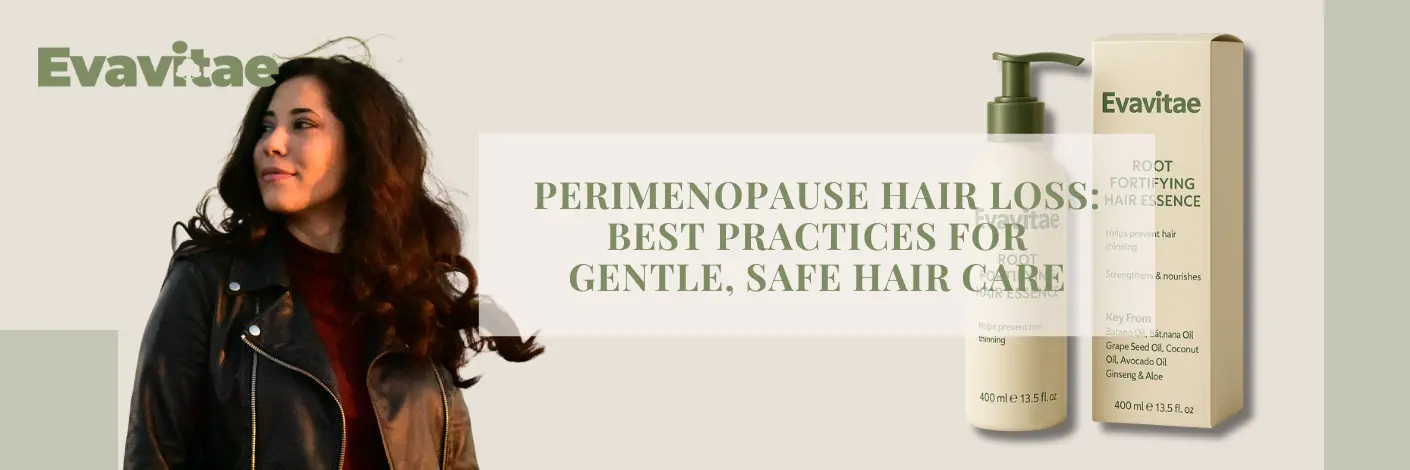Perimenopause can be a confusing time — physically, emotionally, and, yes, follicularly. If you’ve noticed more hair on your brush or in the shower drain lately, you’re not imagining things. Hormonal fluctuations during perimenopause can significantly affect your hair’s thickness, growth rate, and texture. But here’s the good news: With the right gentle, hormone-free hair care routine, you can support your scalp and minimize shedding — without triggering irritation.
In this article, we’ll explain what’s going on with your hair during perimenopause, what ingredients and routines to avoid, and how to create a calming, supportive hair care ritual tailored to sensitive scalps.
What Is Perimenopause — and Why Is Your Hair Thinning?
Perimenopause is the transitional period before menopause, often beginning in your 40s, though it can start earlier. Estrogen and progesterone levels decline, while androgens (like testosterone) may become more dominant. This hormonal shift can lead to a shortening of the hair growth phase (anagen) and an increase in hair shedding (telogen effluvium), especially around the crown and temples.
You might also notice:
Overall hair thinning (not just in one spot)
Dry, brittle strands
Increased scalp sensitivity or itchiness
👉 Fact: Studies show that up to 52% of postmenopausal women report some form of hair thinning (Elghblawi, 2018).
Hormonal shifts during perimenopause are one piece of a much wider puzzle. To learn about other contributing factors and supportive solutions, check out our article on female hair loss causes and gentle care recommendations.
As hormone levels continue to fluctuate and eventually decline, hair may become thinner even beyond perimenopause. For next-stage insights, explore our article on menopause-related hair loss and gentle care solutions for changing needs.
🧪 Harsh Treatments? Not Here.
Unfortunately, many “anti-aging” hair products on the market are packed with strong surfactants, fragrances, and silicones — which can cause further dryness, buildup, and irritation on already sensitive scalps.
Here’s what to avoid during perimenopause:
Sulfates (e.g., sodium lauryl sulfate): Can strip the scalp’s natural oils
Silicones: May coat the hair and clog follicles
Artificial fragrances and dyes: Common irritants for reactive scalps
Hormonal treatments: Not ideal for those seeking gentle, non-medicated support
Instead, choose hair care products that are:
Fragrance-free
Colorant-free
Silicone-free
Dermatologically tested for sensitive skin
Enriched with scalp-supportive nutrients
🌿 Ingredients That Actually Support Hair Health (Without Irritation)
If your scalp feels itchy or tight — or you’re hesitant to try anything new — look for products with a gentle foundation and science-backed ingredients that support the scalp environment.
Some standout ingredients include:
Biotin: Essential for keratin production and overall strand strength
Batana Oil: Rich in oleic acid and antioxidants to support scalp health
Panax Ginseng Extract: Improves circulation and supports hair follicles
Peptides: Help reinforce the hair structure and support new growth
Aloe Vera & Glycerin: Moisturize without clogging follicles
👉 Related Read: Explore our Ingredients Page to see how each component in our formula supports scalp health and growth.
👩🔬 Our Recommended Routine for Perimenopausal Hair Care
Even the best product won’t help much if your overall routine is too aggressive or inconsistent. Here’s a step-by-step gentle regimen:
🧴 1. Cleanse Smart — Not Harsh
Use a sulfate-free shampoo like the Evavitae Root Fortifying Hair Essence, designed to gently remove buildup without stripping oils. Shampoo 2–3 times a week, massaging the scalp softly with your fingertips.
🧴 2. Deep Condition Weekly
Treat your hair to hydration with a weekly mask like the Evavitae FortiRepair Mask, which includes keratin and hydrolyzed barley protein to repair dry, thinning strands.
💆 3. Support with Lightweight Oils
Instead of heavy serums or greasy treatments, try the Evavitae Hair Renewal Serum, a biotin- and plant oil-rich formula that nourishes the scalp and supports natural regrowth without overwhelming the skin.
🌙 4. Protect at Night
Use a satin pillowcase to reduce friction and breakage while sleeping. Consider protective hairstyles to avoid tugging at fragile roots.
🍽️ Lifestyle Tips That Help (Because It’s Not Just About Products)
You can’t out-condition a poor lifestyle — especially during perimenopause. Here are a few supporting habits that promote healthy hair growth:
Eat a balanced, protein-rich diet (think eggs, lentils, nuts)
Take doctor-approved supplements (iron, vitamin D, B12, and biotin are commonly low)
Manage stress: High cortisol contributes to hair loss
Exercise gently: It boosts circulation to the scalp
Avoid smoking and limit alcohol: Both are linked to hair thinning
📖 For more research-based insights, check out this clinical review on hormonal hair loss: here.
❤️ Why We Created Evavitae for Women Like You
Evavitae was born from a desire to create hair care that feels safe — no burning, itching, or wondering what mystery ingredients are doing to your scalp. For women experiencing hair thinning due to perimenopause, we know this journey is personal and sometimes emotional.
That’s why our full line is:
Dermatologically tested and rated “Excellent” by Dermatest®
100% vegan and cruelty-free
Fragrance-free and hormone-free
Designed with sensitive scalps in mind
🎯 Ready to start gentle, confident hair care? Explore the Evavitae Anti-Hair Loss Set.
Final Thoughts
Hair loss during perimenopause is a common and natural experience — but that doesn’t mean you have to suffer through it. With a kind, patient approach and scalp-friendly products, you can support your hair’s health while caring for your whole self.
You’re not just managing hair — you’re reclaiming confidence.
✨ Continue learning about prevention, early signs, and gentle recovery steps in the Hair Loss 101 Hub.
Discover gentle, fragrance-free options and expert guidance in our Postpartum Hair Recovery Guide.
Evavitae products are now available exclusively at www.evavitae.com.





Add comment
You must be logged in to post a comment.